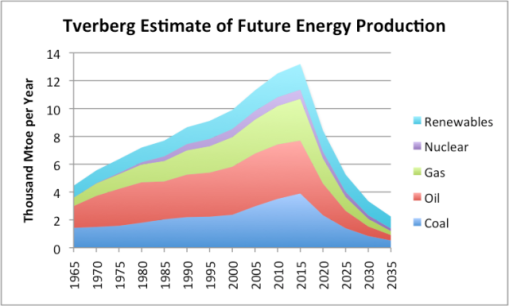After debating with Dave Kimble for several months over the issue of whether we are at a tipping point, it appears he may have been right all along: there’s no way we are even going to reach +2ºC above 1990 temperatures. Looks like McPherson’s forecasts of Near Term Human Extinction was highly overcooked…… Why do I say this? Read on…….
The IPCC detailed report is out and, as Dave predicted, the temperature response for RCP2.6 is +1.5°C, range 1.1 – 1.8 by 2045. Thereafter they show the temperature remaining constant or microscopically getting slightly lower – in the modelling I’ve seen, it was measurably getting lower by 2100.
So no “tipping point” according to IPCC, not even for the highest scenario, RCP8.5.
Gail Tverberg’s latest article is a game changer in my opinion. It completely agrees with Dave:
The Likely Effect of Oil Limits
The likely effect of oil limits–one way or the other–is to bring down the economy, and because of this bring an end to pretty much all carbon emissions (not just oil) very quickly. There are several ways this could happen:
-
High oil prices – we saw what these could do in 2008. They nearly sank the financial system. If they return, central banks have already done most of what they can to “fix” the situation. They are likely to be short of ammunition the next time around.
-
Low oil prices – this is the current problem. Oil companies are cutting back on new expenditures because they cannot make money on a cash flow basis on shale plays and on other new oil drilling. Oil companies can’t just keep adding debt, so they are doing less investment. I talked about this in Beginning of the End? Oil Companies Cut Back on Spending. Less oil means either a rebound in prices or not enough oil produced to go around. Either way, we are likely to see massive recession and falling world GDP.
-
Huge credit problems, such as happened in 2008, only worse. Oil drilling would stop within a few years, because oil prices would drop too low, and stay too low, without lots of credit to prop up prices of commodities of all types.
-
Rapidly rising interest rates, as QE reaches its limits. (QE for the United States was put in place at the time of the 2008 crisis, and has been continued since then.) Rising interest rates lead to higher needed tax rates and high monthly payments for homes and cars. The current QE-induced bubble in stock, land, and home prices is also likely to break, sending prices down again.
-
End of globalization, as countries form new alliances, such as Russia-China-Iran. The US is making false claims that we can get along without some parts of the world, because we have so much natural gas and oil. This is nonsense. Once groups of countries start pulling in opposite directions, the countries that have been using a disproportionate share of oil (particularly Europe, the United States, and Japan) will find themselves in deep trouble.
-
Electric grid failures, because subsidies for renewables leave companies that sell fossil-fuel powered electricity with too little profit. The current payment system for renewables needs to be fixed to be fair to companies that generate electricity using fossil fuels. We cannot operate our economy on renewables alone, in part, because the quantity is far too small. Creation of new renewables and maintenance of such renewables is also fossil fuel dependent.
Given the choice between economic collapse and runaway climate change, collapse is the pick. Collapse, however, brings surprising results according to Gail. Have a look at this chart of hers showing Peak ALL energy happening next year:
 See that pale blue strip at the top? It’s energy produced by renewables. By 2035, it is half the height of what it is today. And the purple nuclear strip is maybe no more than a quarter of today’s……. ALL high tech ‘solutions’ require complex systems driven by cheap and abundant fossil fuels. And the demise of cheap and abundant fossil fuels is exactly what will bring all this complexity to its knees….. If you want energy security for yourself using renewables, I urge you to waste no time, do it now… Gail further states:
See that pale blue strip at the top? It’s energy produced by renewables. By 2035, it is half the height of what it is today. And the purple nuclear strip is maybe no more than a quarter of today’s……. ALL high tech ‘solutions’ require complex systems driven by cheap and abundant fossil fuels. And the demise of cheap and abundant fossil fuels is exactly what will bring all this complexity to its knees….. If you want energy security for yourself using renewables, I urge you to waste no time, do it now… Gail further states:
The IPCC’s Message Isn’t Really Right
We are bumping up against limits in many ways not modelled in the IPCC report. The RCP2.6 Scenario comes closest of the scenarios shown in providing an indication of our future situation. Clearly the climate is changing and will continue to change in ways that our planners never considered when they built cities and took out long-term loans. This is a problem not easily solved.
One of the big issues is that energy supplies seem to be leaving us, indirectly through economic changes that we have little control over. The IPCC report is written from the opposite viewpoint: we humans are in charge and need to decide to leave energy supplies. The view is that the economy, despite our energy problems, will return to robust growth. With this robust growth, our big problem will be climate change because of the huge amount of carbon emissions coming from fossil fuel burning.
Unfortunately, the real situation is that the laws of physics, rather than humans, are in charge. Basically, as economies grow, it takes increasing complexity to fix problems, as Joseph Tainter explained in his book, The Collapse of Complex Societies. Dissipative structures provide this ever-increasing complexity through higher “energy rate density” (explained in the Chaisson article linked above –).
We need to understand what are really up against, if we are to think rationally about the future. It would be helpful if more people tried to understand the physics of the situation, even if it is a difficult subject. While we can’t really expect to “fix” the situation, we can perhaps better understand what “solutions” are likely to make the situation worse. Such knowledge will also provide a better context for understanding how climate change fits in with other limits we are reaching. Climate change is certainly not the whole problem, but it may still play a significant role.
For the whole picture, I can’t recommend reading the original enough…… it may well be the most important article Gail has ever written….



Hi Mike. It’s a tricky business forecasting the behavior of complex systems and we’re trying to do it for three: the climate, Industrial Society and our individual selves. I suppose at the end of all my questing, I’ve come to realise that all I can do is try and fix my own life in the face of whatever happens.
I really do admire Gail’s plugging away at the coal face and the way she so clearly lays out the situation. But as far as I’m concerned, this is just a special intellectual interest of mine and a tiny number of people like me. We all read the same blogs and swim in the same intellectual soup. But is no way the bulk of the population or any decision makers are ever going to take this kind of knowledge on board. It’s just not the way people and world work. I talk to my local federal member and he’s a nice guy, but he just sees me as another harmless eccentric rambling on about peak oil and impending economic disaster. I even had a local Transition initiative going here for a bit until I got sick of all the nonsense that came out of people’s mouths at meetings.
I tried a thought experiment: do wallabies, fleas or frogs need to know about peak oil and climate change to navigate the future? Would it help if they did?
Guy McPherson and his ilk are an interesting case. What seems to be propelling him (and them) is overwhelming anger and/or depression. I think Guy is a nice person but he’s so invested in the system that made him what he is, so trapped by the fact that time has run out for him to start another life, and finding it so hard to let go of all the values which informed him in his rise up the academic slippery pole, that anger or depression are really the only options for him at this time. Life is a shit sometimes. But his anger at anyone who disagrees with him or who doesn’t have the Deep Knowledge is really quite stupid and pointless.
I don’t think that this relative optimism, if one might call it that, is really called for. As far as I can see the climate destabilisation has a great deal of inertia that cannot be reversed. The atmospheric load of greenhouse gases is still increasing, maniacs like Newman, Abbott and Rinehart are still determined to extract billions of tons of coal to be combusted and climate sensitivity seems, to my untrained eye at least, to be on the high side, not the low. Moreover the disaster in the Arctic has a long way to play out, with the albedo flip to dark, heat absorbing seas in summer presaging massive methane losses from submarine clathrates. It would be reassuring to see some cogent argument why this process will not happen, but I’ve not seen it yet.
Add to those factors the rising atmospheric level of water vapour, megafires, melting permafrost, jet stream destabilisation and the slightly extraneous but linked problems of economic implosion under debt and rising inequality and the geo-political recklessness of the dying US Imperium, and a generalised collapse is pretty near certain, barring a miracle, and it will probably lead to war, a Big One, which will be the coup de grace. Just which factors are judged more or less significant might be like working out what killed Rasputin in the end, which, I fear, is nigh.
Does this mean the arctic will not be ice free in the next few years?
Absolutely not…….. but there’s a big difference between an ice free arctic in the summer and near term human extinction.
It looks highly probable that the Arctic will be “ice-free” for one day in the year (probably a day in September) sometime in the next 10 years. However the Sea Ice Minimum value changes each year, due to weather events, sometimes being larger than the year before, sometimes smaller, with the overall trend (due to climate ) being smaller. So it is quite possible that that an “ice-free” day happens in 2017, but doesn’t happen again until 2022 – or a myriad of other similar scenarios.
Gradually the Arctic will be “ice-free” for days at a time every year, then weeks at a time.
“Ice-free” needs to be understood in the context of the definitions. Sea Ice Area and Sea Ice Extent are not the same thing, see https://en.wikipedia.org/wiki/Measurement_of_sea_ice#Types_of_measurements for an explanation – you should probably read the whole article if this comes as a surprise to you. Briefly, Sea Ice Extent is the area where each pixel in a satellite image indicates less than 15% of the pixel’s area is ice. Since these pixels represent 25 Km x 25 Km on the Earth’s surface, you can have the Arctic declared “ice-free” while there are still 180 sq. Km. chunks of ice in the sea (spanning 2 pixels).
The Minimum day, is a self-selected worst data point, unlike saying “on September 21st of that year”, which would give less dramatic results. It is very bad statistically to do projections into the future based on self-selected worst data points.
Of more importance than “ice-free” is the change of reflection/absorption of the whole Arctic over the full annual cycle, because that is what really alters the total amount of heating. That is the thing that shows up the trend due to climate change.
Is not sea-ice volume the crucial parameter, the one that really indicates the near-term fate of the sea-ice, the albedo flip, northern amplification and greenhouse gas emissions from melting permafrost and methane clathrates?
Even without climate change the human race is in dire straits. The projections of 11 billion by 2100 are fantasy. The worlds economy is going away (very soon). Then western civilization is going away, perhaps after a short period pronounced fascism (we are surprisingly well along that track already). Then without our huge technological advantages we will have to cope with the worst of climate change, in a severely degraded biosphere.
The extinction of man by 2040. No. But the dying will be well underway. Population 2100, maybe 11 million. Even with the rosiest of glasses I cannot see more than a billion.
Even the excessively conservative IPCC projections are beyond that which significant sections of the biosphere can cope with.
I think it’ll be a global population of 100-200 million people.
I think it’s important to realize that human extinction will come in two phases. First, an “ice-free” Arctic Ocean will increase the probability of a 50 Gigaton burst or “burp” of Methane being released from the shallow seas of the Arctic Ocean, which the Arctic researcher Natalia Shakhova said could happen “at any time.” This is estimated to cause a rise of global average temperature by 1.3 C or more that 2+ C in the breadbasket regions of the Northern Hemisphere where most of the grain that we and the other animals depend on for food is produced. This will result in mass starvation with the consequent breakdown in industrial civilization. The latter will greatly reduce the emissions of, yes, greenhouse gasses from the combustion of fossil fuels, but also the aerosol particulates that REFLECT solar energy back into space. These particulates quickly fall out of the atmosphere and the average global temperature will rise another 3 C in a matter of days or weeks. Any humans still alive will quickly die out. The only exception might be the .000003 % living in bunkers who may live for a few years longer on canned food.
FASTER THAN EXPECTED
Dr. Guy McPherson is a Professor Emeritus of Natural Resources and Ecology and Evolutionary Biology at the University of Arizona, and the world’s leading authority on Abrupt Climate Change leading to Near Term Human Extinction; that is, he is knowledgeable about the habitat necessary for human survival. As the global average temperature rises above a certain point, it’s not that human beings can’t live at higher temperatures, but that the plants that we and other animals depend upon for food cannot adapt fast enough and they die out.
Based on these facts, and the abrupt rise in global average temperatures due to the predicted 50 Gigaton bursts or “burps” of methane in the Arctic Ocean this year or within the next two years, Dr. McPherson has written an article which includes a timeline for virtual Human Extinction within 10-34 months from now:
https://guymcpherson.com/2017/02/faster-than-expected/
It 2021 were still here this paper predicted the end in 2019. This guy makes a lot of false prediction stop supporting him no other climate scientist backs him up.
I believe the projection was for an ice-free arctic in 2016 +-3 years which would have been 2019. I also believe he said that not that winter but the one after would be an issue for crop production since we can store enough to get through a couple of consecutive winters with poor yields but not many after.
So, maybe we don’t even need a completely ice-free arctic to trigger the end of this mass extinction event. If so, last winter or this one would be in the exact range he talked about. Hopefully, this original projection was off by 50-80 years but I somehow doubt we have anything close to that and considering how too many humans do not want to change their way of life, especially in the US, I don’t see anyone doing anything on time to cool the Arctic soon enough so crops can get the cool air they need for many years into the future.
We also have to take the reduction in aerosol masking which played a part in increasing temps around the world last year and continuing on again this year. You wrote your comment in the winter. The temps all over the northern hemisphere are ungodly hot now and we just started summer. Many places, like in the upper mid-west, even Montana, are experiencing triple digit temps not to mention how even in the arctic, temps are incredibly high. Many people in this region do not even have AC.
Hopefully, he is wrong by a wide margin but even being wrong by 10 years is nothing on a geological time scale.